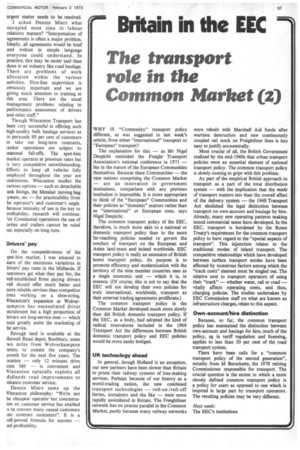The transport role in the Common Market (2)
Page 59

If you've noticed an error in this article please click here to report it so we can fix it.
WHY IS "Community" transport policy different, as was suggested in last week's article, from either "international" transport or "European" transport?
The explanation for this — as Mr Nigel .Despicht reminded the Freight Transport Association's national conference in 1971 — lies in the nature of the European Communities themselves. Because these Communities — the nine nations comprising the Common Market — are an innovation in government institutions, comparison with any previous institution is impossible. It is more appropriate to think of the "European" Communities and their policies as "domestic" matters rather than as "international" or European ones, says Nigel Despicht.
The common transport policy of the EEC, therefore, is much more akin to a national or domestic transport policy than to the more far-reaching policies needed to govern the conduct of transport on the European and Asian land-mass and indeed worldwide. EEC transport policy is really an extension of British home transport policy. Its purpose is to promote efficiency and modernization with the territory of the nine member countries seen as a single economic unit — which it is, in essence. (Of course, this is not to say that the EEC will not develop their own policies for truly international, worldwide, transport as their external trading agreements proliferate.) The common transport policy in the Common Market developed much more slowly than did British domestic transport policy. If the EEC, as a body, had adopted the kind of radical innovations included in the 1968 Transport Act the differences between British domestic transport policy and EEC policies would be more easily bridged.
UK technology ahead In general, though Holland is an exception, our new partners have been slower than Britain to prune their railway systems of loss-making services. Perhaps because of our history as a world-trading nation, the new combined transport technologies — roll-on/roll-off ferries, containers and the like — were more rapidly assimilated in Britain. The Freightliner network has no precise parallel in the Common Market, partly because many railway networks were rebuilt with Marshall Aid funds after wartime destruction and new continuously coupled rail stock on Freightliner lines is less easy to justify economically.
Most crucial of all, the British Government realized by the mid-1960s that urban transport policies were an essential element of national transport policy. The common transport policy is slowly coming to grips with this problem.
As part of the empirical British approach to transport as a part of the total distribution system — with the implication that the mode of transport matters less than the overall effect of the delivery system — the 1968 Transport Act abolished the legal distinction between transport on own-account and haulage by hire. Already, many new operating patterns making sound commercial sense have developed. In the EEC, transport is burdened by the Rome Treaty's requirement for the common transport policy to have regard to the "special aspects of transport". This injunction relates to the traditional modes of inland transport. The competitive relationships which have developed between surface transport modes have been affected by numerous factors among which the "track costs" element must be singled out. The relative cost to transport operators of using their "track" — whether water, rail or road — vitally affects operating costs, and thus, charging policies. The studies undertaken by EEC Commission staff on what are known as infrastructure charges, relate to this aspect.
Own-account/hire distinction
Because, so far, the common transport policy has maintained the distinction between own-account and haulage for hire, much of the policy, eg in tariff regulation and licensing, applies to less than 50 per cent of the road transport system.
There have been calls for a "common transport policy of the second generation", notably from M Borschette, the 1970 retiring Commissioner responsible for transport. The crucial question is the extent to which a more closely defined common transport policy is a policy for users as opposed to one which is inspired in large part by transport operators. The resulting policies may be very different.
















































































































































